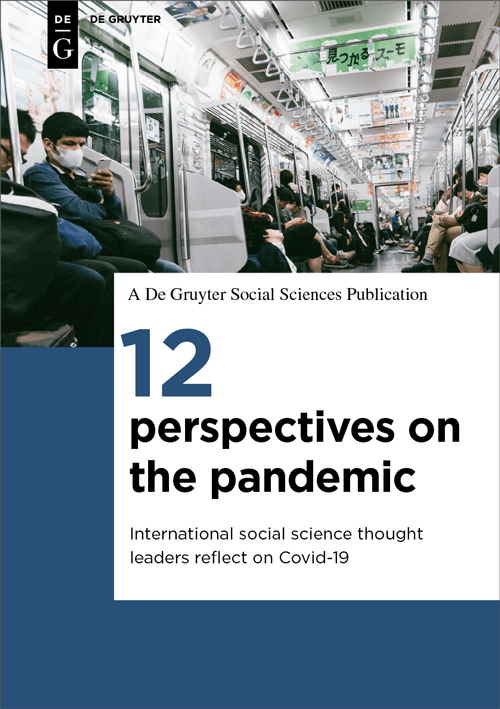What Future for Post-Coronavirus Societies?
There has been great speed to predict our post-Covid-19 future. What is clearer, however, is that institutions and individuals across the globe have already creatively responded to huge challenges to reshape social activities and everyday lives.
This essay was first published in the free digital pamphlet 12 Perspectives on
the Pandemic: International Social Science Thought Leaders Reflect on Covid-19.
In a remarkably short amount of time, Covid-19 has unleashed gripping fears, uncertainties and risks the world over, which is testing social cohesion and globalization to its core. People today are living in a way they never have before — working from home, learning online and exercising outdoors, and many are experimenting in the design of their identities. All of this leads to a fundamental question: will post-coronavirus life be significantly different to life before this global pandemic?
Peak Globalization
In a recent article, ‘Why this crisis is a turning point in history’, the political theorist John Gray equates Covid-19 with the demise of what he terms ‘peak globalization’. Gray argues that, as the virus has gone global, so globalization itself has ultimately come unstuck:
‘The era of peak globalization is over. An economic system that relied on worldwide production and long supply chains is morphing into one that will be less interconnected. A way of life driven by unceasing mobility is shuddering to a stop. Our lives are going to be more physically constrained and more virtual than they were. A more fragmented world is coming into being that in some ways may be more resilient.’
These are important and interesting claims, but I disagree with each of them. Let me briefly say why.
Gray’s diagnosis only holds good if globalization is viewed solely as an economic phenomenon. But such an understanding is not so much incorrect as incomplete. Globalization is not only economic in conditions and outcomes, but also social, cultural, political and historical to its roots. Global pandemics, for instance, arguably change the dynamics of globalization. But it is important to see that, in many respects, the world remains highly interconnected.
Globalizing Dynamics
Coronavirus is a prime expression of our super-global world. Covid-19 looks different from anything we‘ve witnessed before and — due to the forces of globalization — has spread everywhere. Yet, again due to complex globalizing dynamics, the very global nature of Covid-19 means that scientists cooperate worldwide in the search for effective vaccinations or antidotes. In this way, globalization is both a condition and consequence of the virus. Ironically, the very global forces that unleashed this worldwide pandemic are also deeply implicated in its possible eradication.
“Covid-19 looks different from anything we‘ve witnessed before and — due to the forces of globalization — has spread everywhere.”
But, still, the thorny issue remains: what might be the long-term impacts of Covid-19 on our lives and our lives in future times?
There are two key dimensions to addressing this question. The first is institutional, centred on organizational change. The second is cultural, centred on lifestyle change.
At the level of organizations, the virus has arguably accelerated tendencies resulting from the digital revolution which were already well underway throughout the rich north. Faced with government directives concerning social distancing, the central response from industry and enterprise has been to shift many core activities into cyberspace. Offices, schools, universities and other work centres have moved from face-to-face to digital interaction.
Virtual Workstations
Now that the genie has been let out of the bottle, the very definition of work and employment is likely to change permanently. Working from home, or remote working, is unlikely in the future to revert to the ‘second-best’ option. The virtual workstations set up by employees during the pandemic have enabled people to work efficiently and in a way that many had not previously enjoyed.
These innovations are also evident in healthcare. With telemedicine ramped up to provide healthcare remotely by general practitioners during Covid-19, it is surely unlikely to be dumped when the world eventually recovers. Nor is the restaurant industry likely to look the same after the virus subsides. Restaurants have been among the hardest-hit businesses in the pandemic, and a post-Covid-19 world will need to find inventive ways for customers to feel safe. This might include measures such as increased spacing between customers and minimizing human contact through, for example, digital ordering and payment.
Digital Social Lives
What holds for institutions also holds for individuals. Lifestyle change, just like organizational change, has been raised to the second power during Covid-19. From digital dinner parties to Facebook funerals, women and men have been trying out and trying on novel social experiments. From this angle, we can say that coronavirus-enforced quarantine has persuaded people to develop different lifestyle choices — many of which will continue to impact upon social relationships, or jostle uneasily alongside more traditional ways of doing things.
There has been too much rush to predict the post-coronavirus future. What the virus has shown, however, is that institutions and individuals have imaginatively responded to immense challenges to reshape social activities and, as a result, reinvent their lives. How this plays out in the future, and under what scenarios, now falls to the social sciences for further elucidation.
Learn more in this related title from De Gruyter
[Title Image via Getty Images.]
